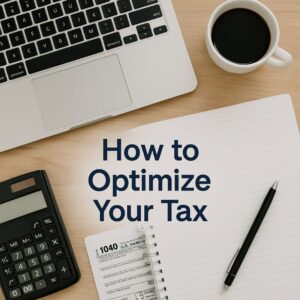
Great question — “how to optimize your tax” depends on your situation (individual, self-employed, company, trust, etc.), but here’s a broad framework you can apply:
📌 1. Know What You Can Claim
Work-related expenses: tools, travel, home office costs.
Depreciation: for equipment and vehicles.
Interest expenses: on qualifying loans (e.g. rental property where allowed).
Subscriptions, memberships: if related to your business or profession.
Training/education: if it maintains or improves current income.
📌 2. Choose the Right Structure
Sole trader, company, partnership, or trust — each has different tax benefits and flexibility.
Use company structure to smooth income and control timing of dividends.
Use family trust where appropriate to spread income or protect assets.
📌 3. Income Timing
Where allowed, delay invoicing to shift income into the next financial year.
Bring forward deductible expenses to the current year.
📌 4. GST Planning (if registered)
Claim GST on legitimate expenses.
Consider the cash basis if cashflow is tight (pay GST only when you get paid).
📌 5. Retirement Contributions
In NZ, KiwiSaver contributions offer benefits (government match, compounding).
Use voluntary top-ups to maximise returns.
📌 6. Use Losses Wisely
Offset current year losses against other income.
Carry forward tax losses for future years (if allowed).
📌 7. Charitable Donations
Claim tax credit for donations (up to 33.33% rebate in NZ).
Keep proper receipts.
📌 8. Recordkeeping
Good records = more deductions + less stress.
Keep digital and physical copies of:
Receipts
Bank statements
Vehicle logbooks
Expense diaries (esp. for home office & vehicle use)
📌 9. Consult a Professional
Tax law changes — what was deductible 2 years ago may not be today.
Tailored advice often saves more tax than it costs.
If you tell me what type of taxpayer you are (NZ individual? self-employed? company owner? trust?) — I can give you a much more specific and practical checklist for your situation.
Want me to? Just tell me who you are optimizing tax for. ✅
